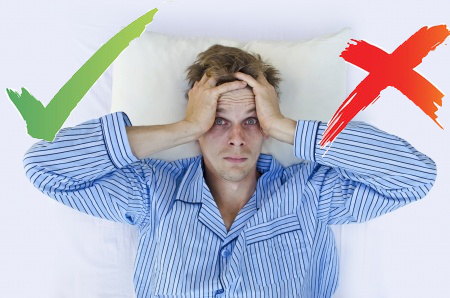Make Sure Of The Following Before Considering Sleep Sedatives
Don’t Ignore Thirst Early In The Day.
Many people don’t feel thirsty early in the day and forget to drink water. Then, during your activities over the course of the day, you continually breathe out water vapor and continually sweat at least small unnoticeable amounts. That water loss adds up to a mild dehydration over the course of the day until the evening arrives and you finally notice that you’re thirsty. So then you start to drink such a wonderfully refreshing glass of water that you have another. And perhaps a third. . .
So now the bladder has just been wound up as an alarm clock. The trouble is it will go off around midnight and then again in the wee hours of the morning. Many people find that after a trip to the bathroom, the brief walk was enough to wake them up and they try to go back to sleep, but it may take hours to fall asleep again.
The moral of the story is to try to remember to start drinking water earlier in the day.
Are You Getting Enough Exercise?
Remember the feeling of “a good kind of tired” from your teenage years? That feeling does not have to be exclusively enjoyed by teenagers. Your exercise routine should be frequent; at least 3 days per week, and intense enough that you would have trouble holding a conversation during the most intense parts of it. While gradually working up to such intensity over time, you should get to the point where you push yourself to the exertion that makes you break a sweat everyday that you exercise. Totally sedentary people tend to have light, easily disturbed sleep. People who really work out are on average better able to get a relaxing, prolonged sleep.
Is Your Bedroom Dark?
Even a little of ambient light in your bedroom – even from a small nightlight or clock radio – can shut down your melatonin production for the night. Melatonin is one wonderful substance that your brain makes, and you definitely don’t want to be without it.
Melatonin is produced by the pineal gland and it has the effects of allowing sleep and has recently shown evidence of being preventative of cancer.
Are There Electrical Fixtures Near Your Bed?
When the brain needs to relax for sleep, it does not need the constant stimulation of electro-magnetic waves. The cell phone, the touch-lamps, the clock radio and other high-EMF items should be removed away from the bed. If the other side of your bedroom wall is where the circuit breakers are located, perhaps your bed could be moved away from that wall.
Have You Had Exposure To Full-Spectrum Sunlight Recently?
Windows, glasses and contact lenses all limit UV light and cut down on our exposure to full-spectrum sunlight. Try to get out in the sunlight for an average of 20 minutes per day, or at least an hour on Saturday and an hour on Sunday, without glasses or contact lenses. Even if you are under the shade of a tree or a porch, you are allowing the sun to reset the internal clock of your pineal gland. This lets the pineal gland know that now is really and truly daylight, so that later will be really and truly nighttime and will allow you to sleep.
Can You Even Make Enough Melatonin?
Tryptophan is an amino acid (piece of a protein) that is the precursor for melatonin. You need enough tryptophan in your diet to be able to make melatonin.
It is high in cottage cheese, turkey (accounting for notoriously sedentary behavior after Thanksgiving dinner), Parmesan and cheddar cheeses and sesame seeds, for example.
Try to make sure you get some of these foods in your diet.
Try these tips first for sleep. If you still need help falling and staying asleep, your local naturopathic physician can evaluate your individual case for nutritional supplements and herbs that can be helpful in your case for getting back to sleep.
See www.naturopathic.org for the largest directory of board-certified, state-licensed naturopathic physicians in the United States.


